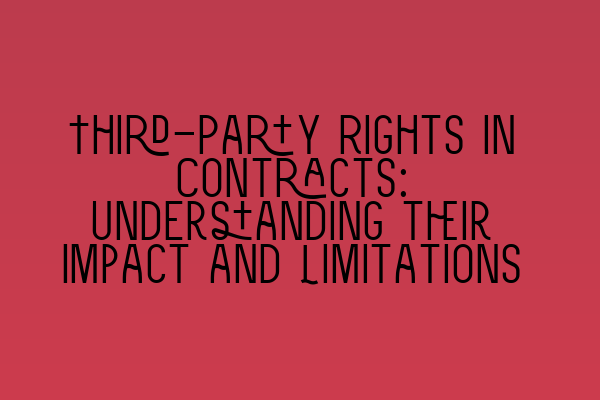Third-Party Rights in Contracts: Understanding their Impact and Limitations
In the complex world of contract law, understanding the rights and obligations of all parties involved is crucial for ensuring a fair and mutually beneficial agreement. While contracts primarily establish a legal relationship between the parties directly involved, they can also have implications for third parties who are not signatories to the contract. These third-party rights can greatly impact the enforceability and effectiveness of a contract, and it is vital for solicitors and legal professionals to have a thorough understanding of their implications.
What are Third-Party Rights?
Third-party rights in contracts refer to the rights acquired by individuals or entities who are not originally part of the contract. These individuals or entities, often referred to as “third parties,” can benefit from or incur obligations under the contract despite not being directly involved in its formation. Third-party rights can arise in various situations, such as when a contract explicitly grants rights to a third party or when certain circumstances create a legal relationship between the third party and the contracting parties.
Types of Third-Party Rights
There are two main types of third-party rights in contracts: third-party beneficiaries and incidental beneficiaries.
1. Third-Party Beneficiaries: A third-party beneficiary is an individual or entity who is expressly named in the contract as someone who can benefit from it. This may include situations where a party agrees to perform certain obligations for the benefit of a third party, or when a contract stipulates that the rights and benefits under the contract can be transferred to a third party. In such cases, the third party has the right to enforce the contract and seek remedies for non-performance or breach.
2. Incidental Beneficiaries: Unlike third-party beneficiaries, incidental beneficiaries do not have the same level of rights and enforceability. An incidental beneficiary is someone who is unintentionally benefited by the contract, even though the contract was not created with their interests in mind. Generally, incidental beneficiaries do not have the ability to enforce the contract or seek remedies for its breach. Their rights are limited, and they are usually unable to claim damages or any other relief in case of non-performance.
Limitations of Third-Party Rights
While third-party rights can provide additional protections and benefits, they are subject to certain limitations and restrictions. It is crucial for legal professionals to be aware of these limitations when advising clients or preparing contracts:
1. Intention: Third-party rights are only enforceable if it was the intention of the contracting parties to provide such rights to the third party. The contract must clearly state the intent to benefit the third party and expressly grant them enforceable rights.
2. Privity of Contract: Privity of contract refers to the relationship between the parties directly involved in a contract. Generally, only those parties who have privity of contract have the right to enforce its terms. Unless a third party is explicitly granted rights under the contract, they will not have a direct enforceable claim.
3. No Variation of Terms: The terms of a contract cannot be varied or amended by a third party without the consent of the contracting parties. Even if a third party has some enforceable rights under the contract, they are still bound by its terms and cannot unilaterally change or alter them.
4. Exclusion of Liability: The contracting parties can include clauses in the contract that exclude or limit the liability of the parties towards third parties. These exclusion clauses can restrict the ability of third parties to seek remedies or claim damages in case of non-performance or breach.
Why Understanding Third-Party Rights is Important
For solicitors and legal professionals, understanding the implications of third-party rights in contracts is essential for providing accurate advice to clients. Failure to consider the potential impact of third-party rights can lead to legal disputes, litigation, and financial liabilities.
By understanding the parameters of third-party rights, solicitors can draft contracts that clearly define the rights and obligations of all parties involved. This can minimize the risk of misunderstanding, ambiguity, or unintended consequences. Solicitors can also help clients navigate the legal landscape and advise on the enforceability and limitations of third-party rights in specific contexts.
In conclusion, third-party rights in contracts can have a significant impact on the enforceability and effectiveness of an agreement. Solicitors and legal professionals must have a thorough understanding of these rights and their limitations to provide accurate advice and facilitate fair and legally binding contracts. By considering the implications of third-party rights, solicitors can help clients navigate the complexities of contract law and minimize the risk of legal disputes.
Related Articles:
– SQE 1 Practice Exam Questions
– SQE 1 Practice Mocks FLK1 FLK2
– SQE 2 Preparation Courses
– SQE 1 Preparation Courses
– SRA SQE Exam Dates
